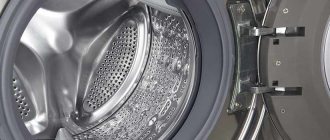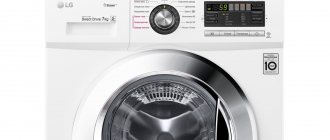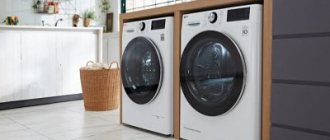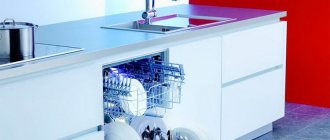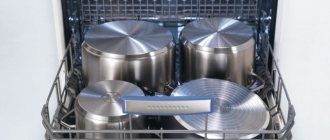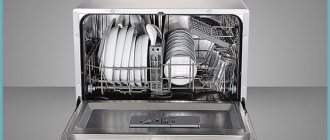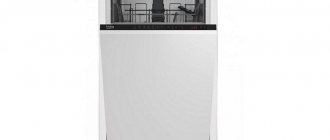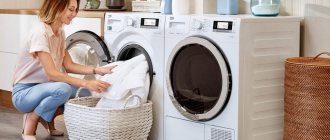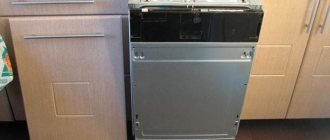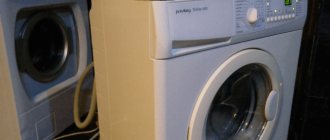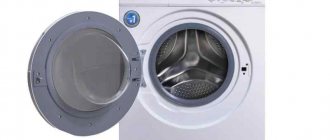Which is better: Siemens or Bosch washing machines? This question is asked by many buyers who want to purchase high-quality German equipment. It’s worth mentioning right away that both brands have long proven themselves to be the best. And not only in the Russian market, but also in the whole world.
In general, washing machines are bought in order to make life easier and thus carve out more free hours: for yourself, loved ones, family, friends. For this reason, every buyer strives to choose high-quality and reliable equipment, sometimes even neglecting issues of price. Meanwhile, when choosing, you need to carefully evaluate the technical characteristics of certain models, as well as study reviews from previous customers.
It is a noteworthy fact that consumers, racking their brains when choosing between machines from Siemens and Bosch, very often deceive themselves to some extent. After all, both brands are part of the same concern and in fact are not much different from each other. Although, of course, there are still differences. And they manifest themselves both in the design of the devices and in some of their parameters.
Why is it not the brand of a German car that matters, but the assembly?
It is worth recognizing that modern developers of household appliances (including washing machines) sometimes merge into holdings, consortiums or concerns. This happens both in order to facilitate competition in the markets for household goods, and in order to simply absorb smaller enterprises, simultaneously increasing their weight and influence.
The brands Bosch and Siemens have been part of the same concern for a long time (since 1967) - BSH Hausgeräte GmbH. It has control over product development across the globe. In total, it produces household appliances at 43 factories, which are located in countries such as Spain, Germany, Russia, Slovenia, France, China, Poland, Mexico, Brazil, as well as in some other countries. The assembly process takes place using the same technologies and from the same parts. For this reason, the quality of the machines is approximately the same.
And yet there is one curious fact. Washing machines, both from Siemens and Bosch, produced in factories in Germany, fail much less often, and their service life is much longer.
It is also noteworthy that in terms of build quality, Germany is followed by China. Chinese technology indeed had a bad reputation for a long time, but today this fact remains a thing of the past. In factories in the People's Republic of China, household appliances under the Siemens and Bosch brands are assembled with due care, and quality control is monitored by numerous experts.
After China, in terms of reliability, comes equipment assembled in Slovenia and Poland. Its quality is somewhat worse, however, in general, everything is pretty good with it. As for the Russian assembly, unfortunately, many buyers do not like it. This is explained by the fact that in many cases, washing machines produced at Russian factories arrive at sales points with existing defects. It can be expressed in torn hatch cuffs, transportation bolts may also be missing, and Aquastop hoses are sometimes damaged.
As you might guess, the stores do not intend to spoil their reputation. Therefore, they simply send such low-quality equipment back to the factories. This practice has been repeated for many years, but it never stops.
Pros and cons of dishwashers
If we talk about general advantages, then both brands are distinguished by German reliability and quality. Both Bosch and Siemens are constantly introducing new technologies and features into dishwashers. So that the consumer can use the equipment as conveniently as possible.
Bosch PMMs belong to different price segments; you can choose a budget or more expensive model. While Siemens machines belong to the premium segment.
Both brands offer built-in, freestanding and compact models. A variety of external designs allows you to choose equipment to suit any interior. You can read about installing dishwashers in our article.
Article on the topic: Where is the heating element in the Ariston dishwasher
To choose the best manufacturer, we recommend comparing the technical characteristics of dishwashers. Things to consider:
- The number of sets of dishes that can be washed at one time.
- Water and electricity consumption (classes).
- Noise characteristics.
- Presence of technologies, functions, programs.
- Levels of protection.
When choosing, pay attention to ease of use - how clear the control panel is.
Top 5 best Bosch washing machines
The German company producing electronic and household appliances Bosch was founded in 1886. And for many years now it has maintained a leading position in sales of its products both in Europe in general and in Russia in particular. This success is explained by the fact that initially the company’s specialists paid increased attention to the quality of assembly, selection of parts, as well as the practicality and functionality of the equipment.
As a result, the number of regular clients of the company regularly grew. But the German company did not stop there and from year to year did everything to make its pricing policy more transparent and its model range more and more diverse.
As a result, there is an abundance of high-quality equipment under the Bosch brand on the washing machine market. Here are just 5 devices that have proven themselves to be very good.
Bosch WLL 2426 S
This machine guarantees high-quality cleaning of items made from any fabric. There is a half load option, when a small amount of water is used and less electricity is consumed. This is especially true in light of recent environmental trends.
The advantages also include silent operation and good capacity of the device.
There are also some disadvantages: the instructions are not very clear, and the beep is too loud.
Bosch WLL 24241
Having such a device, you don’t have to worry about water leaks and complaints from neighbors below. The credit for this part goes to a special sensor that is capable of detecting a leak and automatically turning off the washing machine. In addition, the unit has sensors that change the water consumption, depending on the type of fabric and the size of the loaded laundry.
The advantages also include the beautiful appearance of the device and a large number of different modes.
Some disadvantages include noise during spinning and vibration.
Bosch WLG 20060
This model boasts 15 programs, each of which offers different cycles for many types of fabrics. There is also a pre-wash function for extremely soiled items.
Customers cite the small dimensions of the device, as well as its extremely low noise during operation, as advantages; the lack of a separate rinse is a disadvantage.
Bosch WLG 2426W
This unit has 14 washing functions, including for children's clothes. In addition, there are programs available that eliminate the risk of power surges and also reduce energy consumption.
The positive aspects also include the small dimensions of the device, as well as the ability to customize different options; the disadvantages include some whistling at high speeds.
Bosch WIW 28540
This machine washes a large number of items efficiently and at the same time operates very quietly. The presence of an inverter motor will guarantee that the unit will last a very long time.
The owners of this washing machine also appreciate the presence of fast modes and the presence of an LED display.
Just a little vibration can cause some inconvenience.
Which is better: Bosch or Siemens
Let's compare the main criteria that influence the buyer's choice.
Capacity
Full-size models from both brands can hold from 6 to 15 place settings. Compact PMMs with a width of 45 cm will wash from 6 to 8 sets at a time. The characteristics are similar.
Resource consumption
Bosch and Siemens corporations are constantly working to improve the energy efficiency of their equipment. This is indicated by classes A, B, C and so on. The classes are indicated on stickers located on the body of the dishwasher.
The operating power and energy consumption are approximately the same. Full-size machines consume from 0.8 to 1 kW per hour. Narrow built-in models are somewhat smaller - from 0.7 to 0.83 kW per hour. The most economical are compact PMMs - 0.6-0.7 kW.
The water consumption of both brands is also similar, although there are differences:
- narrow Bosch dishwashers use from 6 to 13 liters, and Siemens from 7 to 13;
- full-size Siemens equipment is more economical - from 6 to 14 liters, while Bosch is from 9 to 14.
Noise characteristics
Here the indicators are also not too different: Bosch - 41-54 dB, Siemens - 41-52 dB. These are excellent characteristics, since equipment with a noise of 45 dB is already considered quiet, which is especially important for families with children.
Article on the topic: Finish dishwasher cleaner how to use
Protection
All dishwashers received full or partial protection - it is better to compare individual models. Some provide a child lock on the panel. The five-stage Aquastop system reliably protects against emergency situations.
Useful programs and functions
Both brands have 5-6 main programs, which include the following types of washing:
- Fast. Need to reduce your dishwashing time? Then set this mode for 30 minutes.
- Economical. Reduced consumption of energy and water resources.
- Intense. Cleans heavily soiled equipment.
- Delicate. Suitable for dishes made of fragile materials.
The amount of additional functionality also affects the ease of use of the equipment. However, it is worth considering that the more new technologies are used, the more expensive the dishwasher costs. The cars of the brands in question boast the following technologies:
- Shine And Dry. New generation drying. Under the PMM tray there is a mineral, which is heated by moisture and heats the air. The technology does not require electricity.
- HygienePlus. Disinfection of devices with hot steam.
- VarioSpeed Plus. By consuming more energy, the machine speeds up the wash cycle.
Having studied consumer opinions, we came to the conclusion that Bosch and Siemens dishwashers have both positive and negative reviews. The effectiveness of washing is influenced by many factors: the correct arrangement of dishes in baskets, detergent, and the selected program.
Top 5 best Siemens washing machines
Many are already accustomed to the fact that Siemens offers its customers high-quality and reliable devices that meet the needs of even the most picky consumers. The company has been using advanced technologies and developments for a long time, which distinguish it favorably from many other enterprises.
The range of washing machines from Siemens is extremely large. And it can take a very long time to choose something that is truly “yours.” Therefore, here is just a small list of devices that can help you decide on the search for the right unit.
Siemens WS 12T440
A small-sized device, which, nevertheless, can accommodate as much as 7 kg of things, is aimed at high-quality work. The machine is distinguished by its low energy consumption and reliable protection against water leaks. The advantages of the device also include the pre-wash function, as well as ease of temperature selection.
The inconvenience may be the inability to reload laundry.
Siemens WS 12T540
The device is equipped with a digital display and an easy-opening door. Owners of this device who have small children can rest assured: the machine is equipped with a protective panel lock.
Additional advantages include the direct injection function, the design of the unit, the presence of a removable cover for installation, as well as a function that prevents things from creasing.
If we talk about the shortcomings, some owners complain that the touch buttons of the household appliance are too sensitive and, in addition, complain about the lack of a drying function.
Siemens WM 16W6H1
This full-sized device, capable of holding up to 9 kg of things, has already been loved by many customers. A rapidly rotating drum, 14 operating modes, multi-level protection against water leaks, control over the foam level - all this is embodied in the WM 16W6H1 washing machine.
The device looks very good, however, its body is quite old.
Siemens WM 14U640
The design of the device, made in white tones with additional black inserts, immediately catches your eye.
One of the most important advantages of the washing machine is the presence of an innovative dosage system, due to which a small amount of powder, water and electricity is consumed during the washing process.
A point that some customers may not like is the vibration of the device during the spin cycle.
Siemens WM 14T6H0
If you ask the owners of this unit what they like most about their washing machine, many will immediately note its powerful engine and large tank for things. And some are pleased with the presence of a delayed start timer and a low sound level.
It will not be possible to reload laundry into the machine. There is also no drying function. And this is exactly what salespeople warn customers about when purchasing a device.
The best PMM models
Now let’s compare individual Bosch and Siemens models to accurately determine the market leader.
Bosch SPV 53M00
A narrow, fully built-in model with dimensions of 82x45x55 cm. With its compact dimensions, the hopper holds 9 sets of dishes, and water consumption is 9 liters. SPV 53M00 has all efficiency classes A.
The equipment is conveniently built in thanks to adjustable legs. 5 washing programs and 5 water supply levels allow you to effectively wash your cutlery. The panel is protected from children (key lock).
Cost from 29,000 rubles.
Bosch SMV53N20
The dishwasher, measuring 85x60x60 cm, can accommodate 13 sets of dishes and is equipped with a powerful inverter motor. The top box is height adjustable, allowing you to place large pots and pans. The machine uses 12 liters of water per cycle. The noise level is 46 dB.
Beam on the floor technology silently notifies the user when work is complete. The gentle wash function allows you to gently clean glass and porcelain items. Built-in leakage protection and key lock on the panel.
Price from 49,000 rubles.
Siemens SN 66MO94
Full size model for 14 sets. Water consumption per cycle is 10 liters, and energy consumption is 0.93 kW per hour. Users will be pleased with the reduced noise characteristics - 42 dB.
Siemens SN 66MO94 includes 6 main programs, there is the possibility of half loading, then the machine will use 30% less resources. There is full protection against leaks and a child lock. The door and keys on the panel are blocked from accidental pressing/opening.
Price from 58,000 rubles.
Destroying myths and making comparisons
It is impossible to say that Bosch and Siemens are competitors. These are trademarks belonging to one concern. The machines differ in technical performance, engineering solutions, cost and level of technological excellence only because they are developed by separate design bureaus.
The list of countries where products are collected is also slightly different. In general, it is difficult to confidently say whose models are better. This depends on the user’s personal assessment, which is influenced by all factors and performance indicators of a particular product. But let’s move on to comparing product lines according to the previously generated list of ratings.
Comparison of consumer attractiveness
Bosch and Siemens are very attractive to consumers. Comparison of dishwashers is always in favor of these brands - with great functionality, German quality and other advantages, the manufacturer offers an attractive price. Another advantage of the products of these brands is the presence of an extensive, equipped service network. Looks good and has a guarantee. It is complete, that is, during the entire declared period, car repairs are carried out free of charge.
Variety of designs
When deciding which dishwasher to choose, most people immediately plan where it will stand, how it will fit into the interior and decor of the kitchen unit. Bosch products are the clear favorite here. Among the entire variety of PMs, you can choose a model that is ideal in terms of fit (if we are talking about built-in equipment) or dimensions (if we are talking about desktop or free-standing units).
Unlike Bosch dishwashers, Siemens products have a fairly standard, generally accepted size range. The same can be said about Electrolux brand products. Ambitious contenders for leadership, companies from Europe and America (Ariston, Indesit, VEKO, Gorenie and others) offer even less. The size range is often meager, and the designs are standardized, expected, without interesting features.
Water consumption
If you compare dishwashers by liquid consumption, you can display approximate statistics for the class of devices.
- In the full-size PM sector, Siemens wins. Average consumption figures range from 6 to 14 liters, with Bosch having a minimum of 9 liters, Electrolux - 10, and the best representatives of European brands - 8 liters.
- In the sector of narrow models, Bosch wins by a small margin. Cars have a minimum consumption of 6 liters, Siemens shows 7, Electrolux and others - from 8 liters and above.
- Compact desktop and built-in machines provide a wide variety of results. Here the main competing brands are close to the leadership, but lag behind Electrolux and some European products. So, a product from a Swedish brand will consume 6.5-7 liters, Bosch is literally breathing in your back with 7-9 liters, and other brands show consumption from 8 liters.
Household appliances from well-known companies such as Bosch and Siemens occupy a significant part of the Russian market. The products of these German manufacturers are famous for their high quality and reliability. Since both companies have an equally good reputation, consumers often wonder which dishwasher is better: Bosch or Siemens?
Brand benefits
Both of these brands have been on the Russian market for quite a long time and have earned high ratings and recognition from consumers. German manufacturers make reliable, high-quality equipment that serves the user for a long time. The developers of both companies are constantly improving their product range and producing better and better devices, introducing innovative technologies.
Bosch, like Siemens, produces compact and full-size models that meet modern requirements. If you compare their technical characteristics, they will turn out to be approximately the same. Both companies are working to reduce energy consumption and reduce noise levels, which is very important for such equipment.
Dishwashers from Bosch have a fairly wide range of models, in which there are both expensive and budget devices. This manufacturer is considered affordable in terms of pricing, which makes it possible to choose an inexpensive model with excellent technical performance.
Siemens dishwashers are also reliable devices that have good functionality. They were recognized as the best in the premium class segment, as energy-efficient and low-noise units.
Brands of washing machines: advantages and disadvantages
When choosing a suitable model, it is important to take into account the specifics of manufacturing companies and their products.
Electrolux
Silent, reliable technology with many programs and functions and a clear interface. There are mid-price and premium devices with improved characteristics. This brand raises almost no complaints among service employees, as well as among its owners.
Bosch and Siemens
Simple and reliable to use devices with a wide price range of models - from affordable to premium options. The cost of a Bosch/Siemens model is proportional to its functionality: inexpensive machines are equipped with standard functions, which they cope with “excellently”, while expensive machines have many useful programs and additional modes.
The disadvantages are the high price of spare parts and the waiting period for arrival at the service warehouse, since the machines are equipped only with original German parts.
LG
The Korean concern produces decent equipment: intuitive to use, durable and strong. The device copes with the task of washing and spinning efficiently, is silent in any mode and rarely fails.
In order to improve technical characteristics, the manufacturer has developed a direct drive system for a number of its models. According to service engineers, this is the only possible weak point in the design of the washing machine - when the bearing seal wears out, water can enter the direct drive, which can lead to failure of the control unit. However, the company more than compensates for this shortcoming with a 10-year warranty period.
Ariston, Indesit
These brands are compared to each other due to their identity - both are represented by budget models, they have good spin stability, reduced noise levels, functionality, a variety of programs and a clear interface.
A significant drawback is revealed during repairs - the drum of the devices of these companies is cast, and if the bearing fails, the entire structure has to be changed. Repairs in this case are much more expensive.
ARDO
Stable cars with low noise levels and an attractive design typical of the “Italians”. However, shortcomings in the fastening of shock absorbers and tank suspension lead to regular breakdowns, and washing machines of this brand end up in the hands of service technicians much more often than their compatriots, Ariston and Indesit.
EYELID
In our country, equipment from a Turkish manufacturer is in demand: the low price combined with functionality attracts Russian buyers. Despite the fact that experts bypass the VEKO brand when compiling reliability ratings, owners often praise it: for its durability, functionality, simplicity and ease of use.
If you are choosing a washing machine based on a modest budget, then it is worth taking a closer look at the BEKO models, but if the criteria are noiselessness, reliability and quality, then it is wiser to turn to competitors’ lines.
Zanussi
Until 2011, this equipment did not cause any complaints and served for decades, but now component breakdowns have become so frequent that repair specialists recommend purchasing it only if it is assembled in Europe. The assembly of models sold in Russian stores is carried out in the Russian Federation.
Samsung
Reviews are mixed - some praise the brand, noting a number of successful models, some complain about wear and tear of parts (shock absorbers, drum suspension spring, etc.). Consumers are dissatisfied with frequent breakdowns and the fragility of the device, which is not justified even by the affordable cost of some models.
Atlant
Inexpensive compact machines from a Belarusian manufacturer of household appliances. When compared with devices from reputable European brands, Atlant washing machines are inferior to foreign competitors in terms of build quality and reliability. Among the real reviews there are many complaints.
Candy
Just 7-10 years ago they had an excellent reputation and were valued for their long and trouble-free service, but recently the quality of the equipment, according to service engineers, has deteriorated. This is probably due to the cheaper models - today Candy equipment is assembled in Russia.
Despite this, customer reviews are positive: simplicity and ease of use, washing quality and an attractive price keep Candy competitive among budget devices.
Video testing of washing machines of different brands:
